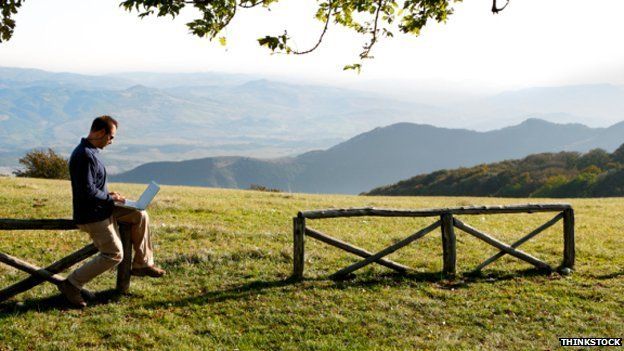Rural broadband verdict - too little, too late
- Published
- comments

It always seemed an unlikely ambition - but now we know that Jeremy Hunt's promise that Britain would lead Europe in fast broadband provision by 2015 will not be met. The former culture secretary made the promise back in 2010 when he unveiled the £530m plan to bring fast broadband to rural Britain.
Now the National Audit Office has found that the whole programme is nearly two years behind schedule, so it may be 2017 before we can boast about our tiptop broadband to our European neighbours. What's more, the government's plan to spark a competition between telecoms firms to lay fibre across the country has also proved a failure.
BT will now win every contract, and will end up with a government subsidy of £1.2bn once you throw in the matching funds that every council has had to provide. Now the company may claim, with some justification, that nobody else saw a commercial case in getting involved in rural broadband. But the end result of this very lengthy process has been to squash the competition and make life harder for smaller rivals that could have been more innovative.
Take, for example, the Isle of Wight. There a company called Wightfibre laid fibre optic cables a decade ago - its investors lost money by betting too early on fast broadband - and now has about 4,000 customers on the island. The Isle of Wight council is about to sign the £6m contract to bring fast broadband to those parts of the island that the market wont reach.
But because of the way the national procurement process was framed, Wightfibre was unable to qualify to compete for that money because the company wasn't big enough to supply other parts of the country. So BT will get the subsidy. And Wightfibre's CEO John Irvine says that will make it even harder for his firm to compete. "I'm not saying: 'Give me that £6m'," says Mr Irvine. "Just don't give it to BT."
The council says, quite understandably, that its job is to make sure that its more far-flung households aren't left on the wrong side of a digital divide, and it has to obey the national rules to get access to the national funds.
The other complaint is about what happens to the final 10%, the very hardest people to reach - though the government is now saying that should only be 5% by 2017. The companies and community groups with ambitions to fill this last gap in the UK's broadband provision say they are in limbo right now because of a lack of information.
They say BT is being secretive for commercial reasons about exactly where its fast services will reach in each county. Until it's known whether the company will actually be laying fibre to Much-Binding-in-the-Marsh, the argument goes, it is impossible for the Much Binding community network to start digging.
BT, which has been summoned to a rural broadband summit by the current Culture Secretary Maria Miller to discuss this issue, says it can take six to nine months after the signing of a contract to work out exactly which areas will be reached.
Overall, the UK is not doing too badly in fast broadband provision - in the cities at least. Speeds, competition and availability are all on an upward trend.
But that makes it all the more galling for people in many rural areas. They've been promised jam tomorrow - and now they are wondering whether tomorrow will ever come.